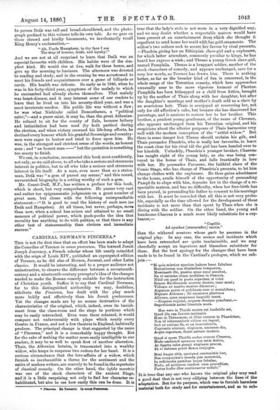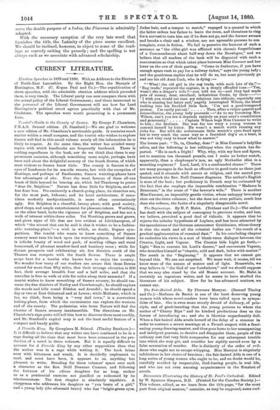CARDINAL NEWMAN'S PINCERNA.*
THIS is not the first time that an effort has been made to adapt the Comedies of Terence in mum pueroram. The learned Jesuit Joseph Jouvency, a French scholar whose life nearly coincided with the reign of Louis XIV., published an expurgated edition of Terence, as he did also of Horace, Juvenal, and other Latin classics. It would be interesting, and to a proper audience not uninstructive, to observe the difference between a seventeenth- century and a nineteenth-century preceptor's idea of the changes needed to make the Roman comedy suitable for the instruction of Christian youth. Suffice it to say that Cardinal Newman, for to this distinguished authorship we may, doubtless, attribute the Pincerna, has dealt with the play much more boldly and effectively than his Jesuit predecessor. Yet the changes made are by no means destructive of the characteristics of the original, which, indeed, owes its banish- ment from the class-room and the stage to portions which may be easily retrenched. Even were these retained, it would compare not unfavourably with plays which nearly every theatre in France, and not a few theatres in England, habitually produce. The principal change is that suggested by the name of "Pincerna," and it is a remarkably happy thought. But for the sake of making the matter more easily intelligible to our readers, it may be as well to speak first of another alteration. Thais, the Athenian hetaira, is transmuted into a wealthy widow, who keeps in suspense two suitors for her hand. It is a curious circumstance that the love-affairs of a widow, which furnish so inexhaustible a theme for the sentiment and the satire of modern writers, are scarcely to be found in the repertoire of classical comedy. On the other hand, the infida meretrix was one of the stock characters of the ancient Stage, and it is a, little surprising not only to find her character re- habilitated, but also to see how easily this can be done. It is
• Placenta. Ex Tommie. Is usum Pasterns.
true that the lady's stela is not worn in a very dignified way, and we may doubt whether a respectable matron would have been present at an entertainment from wiiich she thought it expedient to send home her maid with her gold ornaments. The -widow's two suitors seek to secure her favour by rival presents, —Phaedria giving her an Ethiopian slave-girl and a cupbearer, for which latter attendant, commonly peculiar to kings, he has heard her express a. wish ; and Thraso a young Greek slave-girl, named Pamphila. Thraso is a braggart soldier, another of the stock characters of comedy, and appears unchanged, save for a very few words, as Terence has drawn him. There is nothing better, as far as the broader kind of fun is concerned, in the whole range of the Terentian comedy, which here approaches unusually near to the more vigorous humour of Plautus. Pamphila has been kidnapped as a child from Attica, brought up by the mother of Thais along with her daughter, but after the daughter's marriage and mother's death sold as a slave by an avaricious heir. Thais is overjoyed at recovering her, not only for old affection's sake, but because she has discovered her parentage, and is anxious to restore her to her brother. This brother, a prudent young gentleman, of the name of Chremes, also appears unchanged from his Terentian original, and his suspicions about the ulterior purposes of Thais harmonise very well with the modern conception of the "artful widow." But there is some danger lest Thraso should reclaim his gift, and Thais persuades Phaedria, who is really her favourite, to leave the coast clear for his rival till the girl has been handed over to her kinsfolk. Unluckily, Phaedria's younger brother, Chaereas has caught sight of the young lady, as she was being con- veyed to the house of Thais, and falls frantically in love with her. He persuades Parmeno, the faithful slave of the Comic Stage, who has charge of Phaedria's presents, to let him change clothes with the cupbearer. He thus gains admittance to the house, avails himself of the opportunity of persuading PampF ila to elope with him, deposits her in the charge of a re- spectable matron, and has no difficulty, when her free-birth has been proved, in persuading his father to consent to his marriage with her. It must be conceded that all this is not very proba- ble, especially as the time allowed for the development of these incidents is not more than that spent by Thais when she is dining with the soldier. On the other hand, the young and handsome Chaerea is a much more likely substitute for a cup- bearer,—
" Capillis Ad cyathos [statuendus] unotis,"
than the withered creature whose garb he assumes in the original play. In any case, the scenes and incidents which have been retrenched are quite inadmissible, and we may cheerfully accept an ingenious and blameless substitute for them. But the beet apology for the changes that have been made is to be found in the Cardinal's prologue, which we sub- join:— "Si quis miretur 'Tech= habere hano fabulam Rocentiornm non dissimilem tompornm, Meminerit ille, passim quae mine assolent, Ea vi naturae otiam acoidisse in Graocia. Nihil oat quod in poets reprobes, si volet Senem Rhodionsem uxorem deem.% tune until Viduam ex merit° mortno ditescoro ; Argutam porro et pulchram ease of matabilom ; Migrare Athenas ; ibi amatores plarimos Allicere, quos euspensos languide tenet, —Ecquem rejiciat, ecquom dealt:me praeferat,— Superbientis animi blandula mora.
Hoc vero in Thal& nostra sat laudabile est, Quod ills sus favoris inclinatio Hine in Thrasonom, of illinc rursum in Phaedriam, Non id inhumanioris vitium est input, Sod ox ratione fit, of ox benevolontia, Cupientis nimium, virginetn, amissam dia, Aegre repertam, fratri salvam traders.
Quod si spem Thaldis audax resecat Chaerea, Modo ambiendi sponsam non Heti' Attioo, At Sparta tales genuit virginum proms, Et vi Sabinas petiit Roma conjuges.
Boni Ramie sitis, quotquot convenistis hue, Nee compositoris mends jam moremini, In reficiendis partibus hujus fabulae, Mode, ad actionem tandem cam proceditur, Partos hodio illae sustineantur sedulo."
It is true that any one who knows the original play may read a good deal that is not very edifying between the lines of the adaptation. But for its purpose, which was to furnish harmless material both for study and for entertainment, and so to sub•
serve the double purpose of a ludas, the Finest-ma is admirably adapted. With the necessary exception of the very late word that furnishes the title, the Latinity of the piece seems excellent. We should be inclined, however, to object to some of the read- ings as scarcely suiting the prosody ; and the spelling is not always such as we associate with advanced scholarship.































 Previous page
Previous page